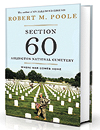
Section 60, Arlington National Cemetery: Where War Comes Home, by Robert M. Poole, Bloomsbury USA, New York, 2014, $27
Section 60 is Robert Poole’s second book about Arlington National Cemetery. The first, On Hallowed Ground, was a general history of the site and its development. This book centers on one of the more recently opened areas, Section 60—which holds the dead from Iraq and Afghanistan—and relates the stories of some of the men and women interred there. Poole does this with deep respect for the fallen, for their families and friends, and for the ceremonies with which the services honor their own.
It’s not an easy book to read in some respects. Not everyone the author writes about died in combat or even abroad. He covers a broad spectrum—combat deaths, yes, but also a soldier who succumbed to post-traumatic stress disorder and committed suicide, and another who died at home from wounds and donated his heart and other organs. Poole also shares the stories of visitors to Section 60, including Judy Meikle, who received the heart of Corporal Ben Kopp, the aforementioned organ donor. Meikle has befriended Ben’s mother, Jill Stephenson, who, whenever the two meet, asks to touch Ben’s heart. “It always beats faster when I touch it,” Stephenson says.
Poole includes many such stories—of devotion, heroism, self-sacrifice, all the best that comes with warfare. And, of course, all the worst—the turns of fate that lead to death, the friendly fire that kills one’s fellows, the underlying brutality of war. The accounts are moving, many intensely so. Among the latter is that of Colleen Shine, whose pilot father was lost over Vietnam. Shine went to Vietnam to find his body, succeeding after an official military search team had bungled the job. At his burial in Arlington, as he was being lowered into the grave, four F-15 fighters roared over the cemetery in tight formation. One then broke off and rocketed straight into the sky, symbolizing the missing man. Filled with such images, Poole’s book serves as a paean to the men and women of the U.S. military.
—Anthony Brandt




